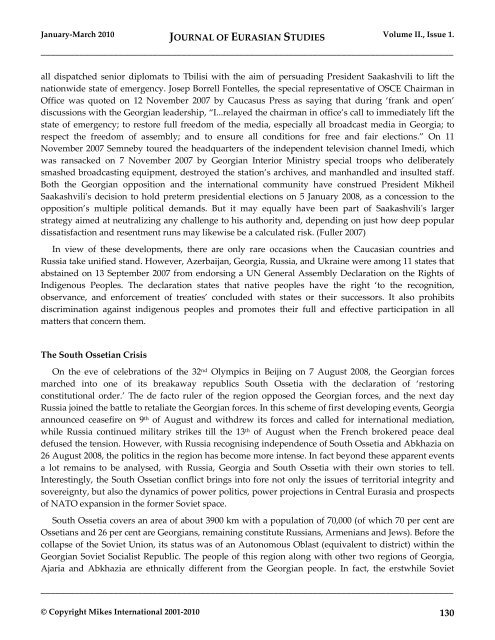EurasianStudies_0110..
EurasianStudies_0110..
EurasianStudies_0110..
Create successful ePaper yourself
Turn your PDF publications into a flip-book with our unique Google optimized e-Paper software.
January-March 2010 JOURNAL OF EURASIAN STUDIES Volume II., Issue 1.<br />
_____________________________________________________________________________________<br />
all dispatched senior diplomats to Tbilisi with the aim of persuading President Saakashvili to lift the<br />
nationwide state of emergency. Josep Borrell Fontelles, the special representative of OSCE Chairman in<br />
Office was quoted on 12 November 2007 by Caucasus Press as saying that during ‘frank and open’<br />
discussions with the Georgian leadership, “I...relayed the chairman in office’s call to immediately lift the<br />
state of emergency; to restore full freedom of the media, especially all broadcast media in Georgia; to<br />
respect the freedom of assembly; and to ensure all conditions for free and fair elections.” On 11<br />
November 2007 Semneby toured the headquarters of the independent television channel Imedi, which<br />
was ransacked on 7 November 2007 by Georgian Interior Ministry special troops who deliberately<br />
smashed broadcasting equipment, destroyed the station’s archives, and manhandled and insulted staff.<br />
Both the Georgian opposition and the international community have construed President Mikheil<br />
Saakashvili's decision to hold preterm presidential elections on 5 January 2008, as a concession to the<br />
opposition’s multiple political demands. But it may equally have been part of Saakashvili's larger<br />
strategy aimed at neutralizing any challenge to his authority and, depending on just how deep popular<br />
dissatisfaction and resentment runs may likewise be a calculated risk. (Fuller 2007)<br />
In view of these developments, there are only rare occasions when the Caucasian countries and<br />
Russia take unified stand. However, Azerbaijan, Georgia, Russia, and Ukraine were among 11 states that<br />
abstained on 13 September 2007 from endorsing a UN General Assembly Declaration on the Rights of<br />
Indigenous Peoples. The declaration states that native peoples have the right ‘to the recognition,<br />
observance, and enforcement of treaties’ concluded with states or their successors. It also prohibits<br />
discrimination against indigenous peoples and promotes their full and effective participation in all<br />
matters that concern them.<br />
The South Ossetian Crisis<br />
On the eve of celebrations of the 32 nd Olympics in Beijing on 7 August 2008, the Georgian forces<br />
marched into one of its breakaway republics South Ossetia with the declaration of ‘restoring<br />
constitutional order.’ The de facto ruler of the region opposed the Georgian forces, and the next day<br />
Russia joined the battle to retaliate the Georgian forces. In this scheme of first developing events, Georgia<br />
announced ceasefire on 9 th of August and withdrew its forces and called for international mediation,<br />
while Russia continued military strikes till the 13 th of August when the French brokered peace deal<br />
defused the tension. However, with Russia recognising independence of South Ossetia and Abkhazia on<br />
26 August 2008, the politics in the region has become more intense. In fact beyond these apparent events<br />
a lot remains to be analysed, with Russia, Georgia and South Ossetia with their own stories to tell.<br />
Interestingly, the South Ossetian conflict brings into fore not only the issues of territorial integrity and<br />
sovereignty, but also the dynamics of power politics, power projections in Central Eurasia and prospects<br />
of NATO expansion in the former Soviet space.<br />
South Ossetia covers an area of about 3900 km with a population of 70,000 (of which 70 per cent are<br />
Ossetians and 26 per cent are Georgians, remaining constitute Russians, Armenians and Jews). Before the<br />
collapse of the Soviet Union, its status was of an Autonomous Oblast (equivalent to district) within the<br />
Georgian Soviet Socialist Republic. The people of this region along with other two regions of Georgia,<br />
Ajaria and Abkhazia are ethnically different from the Georgian people. In fact, the erstwhile Soviet<br />
_____________________________________________________________________________________<br />
© Copyright Mikes International 2001-2010 130

















